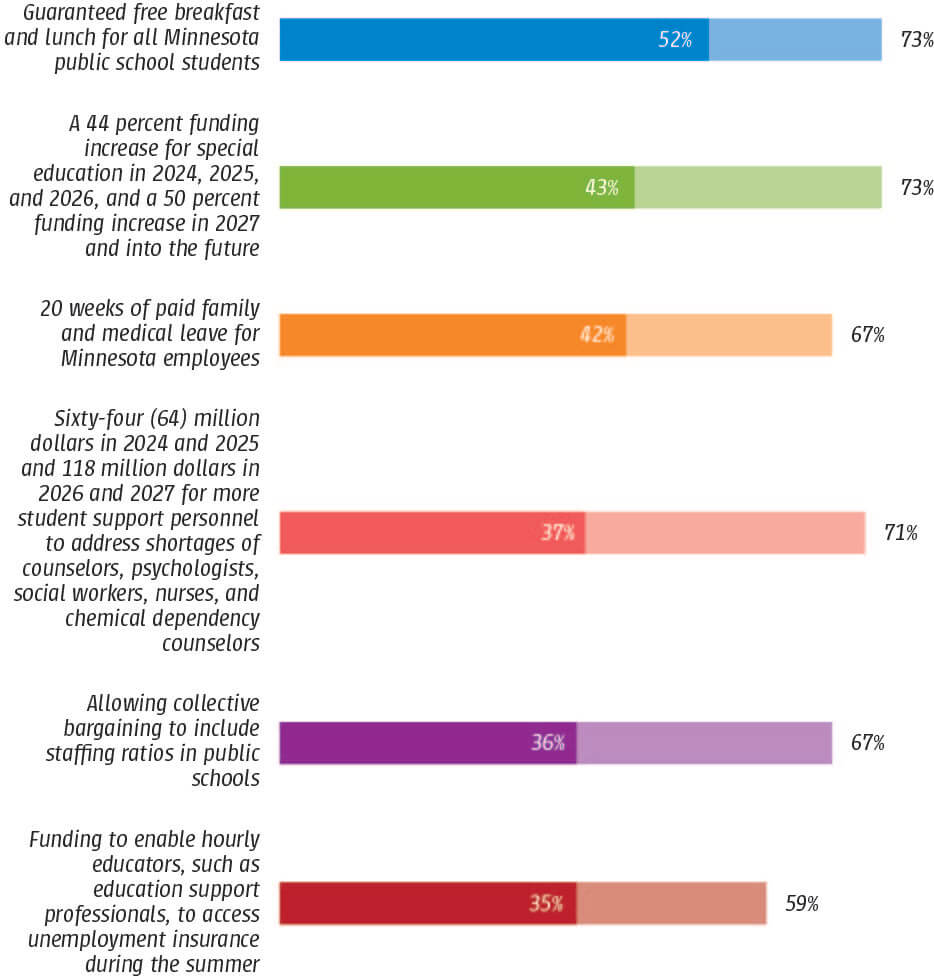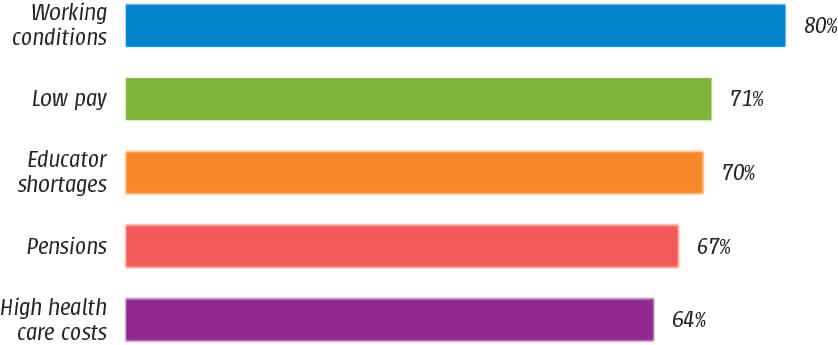
Demoralizing working conditions, compensation that is failing to sustain educators’ families, and retirement anxiety were near universal concerns in a new poll of Education Minnesota members commissioned by the union.
The poll found burnout, educator shortages and personal financial issues, including pay, pensions and health insurance, were top concerns among members. While not among the top-tier issues, workplace safety was close behind.
The pollsters also found strong support for the union and its advocacy for the rights and benefits of members and for fully funding public schools. About eight in 10 members credited the union with passage of important education laws in the 2023 session of the Legislature.
However, just over 10 percent of members frequently considered dropping their membership. The most common reason was leaving the profession, which could be another symptom of the widespread concerns about burnout and compensation.
Among the demands of the job category, educators noted as problems: Workloads and caseloads, class sizes, understaffing, lack of respect, lack of prep time and the stress of finding the right work-life balance.
LRP, a nationally-recognized polling firm, surveyed 9,295 union members by telephone and email from Sept. 19-Oct. 8, 2023. The data were weighted slightly by gender, region, age, membership type and years worked to reflect attributes of Education Minnesota membership. The margin of error was plus or minus 1 percentage point.
What issues do members care about?
The pollsters asked educators about their workplace concerns and how intensely they felt those concerns. Working conditions that burned out educators was the most important issue with 80 percent of members saying they were very concerned.

Following closely behind, were: Low pay (71 percent very concerned), educator shortages (70 percent), pensions (67 percent), and high health care costs (64 percent.)
When asked specifically what members want Education Minnesota to prioritize, the issues that stood out were:
Increasing salaries (59 percent top priority, 89 percent top or high priority).
Providing affordable health insurance (53 percent top priority, 86 precent top or high priority)
Reducing penalties and lowering the retirement age for a pension (52 percent top priority, 77 percent top or high priority).
Providing a safe place to work and learn and reducing the educator shortage were also priorities.
Workplace safety was a second-tier issue for members, but just barely. Nearly six of 10 members said they were somewhat or very concerned about safety in their workplace, with the most concern in the Twin Cities (34 very concerned), among Black educators (53 percent very concerned), Latinx (38 percent very concerned) and education support professionals (38 percent very concerned.)
The top resource educators said was important for safety was school administrators who support educators (89 percent very important, 97 percent important), followed by mental health counselors who can respond to students in crisis (77 percent very important, 94 percent important). School resource officers were the least important resource on the list for educators, although 72 percent said they were still important.
Educator burnout
More than nine of 10 Education Minnesota members were concerned about burnout and nearly all of them were “very concerned,” making addressing the cluster of issues around working conditions a top priority for Minnesota educators.
Ninety-four percent of educators said burnout affects their workplace and nearly three-quarters of them said it affected them “a lot.”
Digging a little deeper into the issue, the pollsters identified key workplace issues that were exhausting educators physically and emotionally: Demands of the job, negative interactions with parents and students, problems with school administrators, and low compensation.
Within the category of students and parents, educators cited: Student misbehavior and discipline, unsupportive parents, and the demanding mental health and learning needs of students.
Management was also a problem for many educators, with a quarter of them saying their administration is not supportive or they lack resources, while a smaller number also mentioned requirements from the state or management that creates additional work.
Nearly one in five educators said low pay drives burnout.
Pensions and retirement
In addition to being a top concern, a plurality of members (45 percent) said they are not satisfied by the retirement benefits they receive, compared to 43 percent who were satisfied. A quarter said they were not at all satisfied.
Around a quarter of members said they are not likely to continue working as an educator until they are eligible to retire, and a similar number were not confident that they will continue working in education.
Opinions toward our union
A majority of members (62 percent) said Education Minnesota did an excellent or good job at representing educators in the state. ESPs and Black members were especially supportive, with more than 70 percent for both groups saying their union did a good or excellent job.
Nearly six in 10 members overall said they never considered discontinuing their membership in the past year. However, the low morale and job frustration found in other polls was also reflected in the Education Minnesota poll. Fourteen percent of the members said they frequently considered dropping their membership. The most common reason cited was a desire to leave the profession.
When asked about whether it was more important for their union to advocate for member rights and benefits, or for increasing state education funding, the members said both were important. However, 90 percent of members said advocating for member rights and benefits was very important. Slightly fewer, 82 percent, said lobbying for education funding was very important.
A majority of members say most of the legislative accomplishments Education Minnesota fought for in the last year had a positive impact on their lives. The top effects chosen by members were: guaranteed breakfast and lunch for students (52 percent very positive, 73 percent positive), a funding increase for special education (43 percent very positive, 73 percent positive), and 20 weeks of paid family and medical leave (42 percent very positive, 67 percent positive).
After hearing the list of accomplishments, 78 percent of members give Education Minnesota credit for helping get legislative wins passed.


